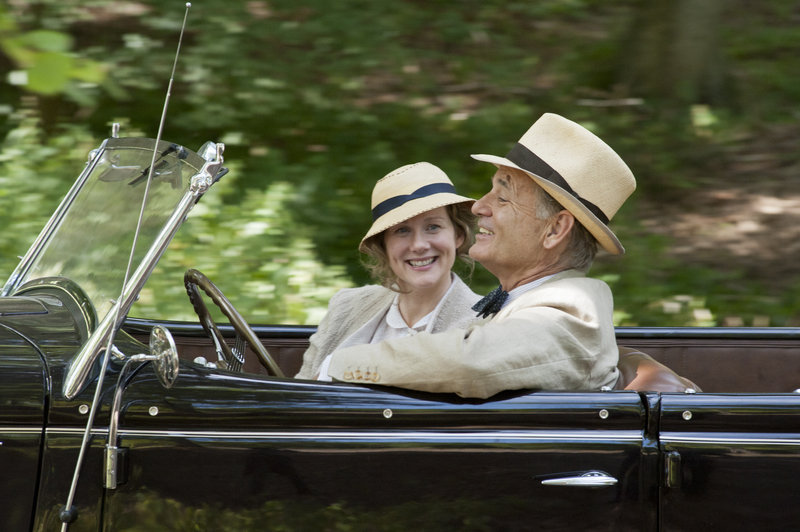At first glance, choosing Bill Murray to play Franklin D. Roosevelt looks like a blatant case of stunt casting, the kind of attention-grabbing gambit inspired more by marketing than verisimilitude. But within just a few minutes of “Hyde Park on Hudson,” it becomes clear that Murray makes an inspired choice, his ineffable combination of natural appeal and oddly recessive diffidence melding flawlessly with Roosevelt’s own hidden depths.
What’s more, the political capital Murray has earned with audiences over the years turns out to be crucial in this alternately charming and unsettling story, which transpires over a pivotal summer weekend in 1939, when Britain’s King George VI visited FDR’s Hudson Valley estate in order to gain the president’s support in the coming war. That also was a time, the movie suggests, when Roosevelt was pursuing one of a number of extramarital affairs, in this case with a distant cousin named Daisy Suckley.
Suckley, played by a washed-out-looking Laura Linney, narrates “Hyde Park on Hudson,” which begins with her being unexpectedly summoned to take tea with the 32nd president, divert him with companionable conversation and take a look at his stamp collection. “You must have met all of them,” she says, looking at the images of world leaders spread before her. “Not all of them,” he murmurs, as the camera rests on Hitler. “Not yet.”
The air of impending cataclysm gives “Hyde Park on Hudson” a timely, urgent edge, and the movie is at its best when it focuses on the budding “special relationship” between America and England, which was given a considerable boost during that eventful visit. The film, directed with lots of circling cameras and scrumptious period detail by Roger Michell, is worth the price of admission if only for the inimitable way Olivia Williams’ Eleanor Roosevelt delivers a passive-aggressively awkward curtsy upon meeting Elizabeth (Olivia Colman), or later when Roosevelt engages the stammering King George (affectingly portrayed by Samuel West) in a confiding, postprandial conversation over drinks. Through a mutual love of a nightcap — not to mention shared physical hardships and the burdens of leadership — Roosevelt establishes an almost paternal relationship with the young monarch, who seems visibly to come into his own under the older man’s supportive, affectionately empowering gaze.
It’s the most moving sequence of “Hyde Park on Hudson.” which juxtaposes Roosevelt’s canny handling of King George with the less salutary aspects of those talents, expressed in the ways he manipulates Daisy, Eleanor and his private secretary, Missy (Elizabeth Marvel). As pleasurable as it is to watch FDR brilliantly parlay a simple picnic into a political tour de force (never have hot dogs figured so prominently in geopolitical negotiations), his relationships with the women in his life are far more problematic, as his affair with Daisy veers into exploitation. (Richard Nelson’s script for “Hyde Park on Hudson” engages in its share of speculation as to how far their involvement went, inspired in part by a cache of letters and diaries that were discovered after Suckley died in 1991.)
The problem with “Hyde Park on Hudson” isn’t its suggestion of FDR’s dark side. That complexity, and Murray’s spot-on portrayal of a man juggling myriad pressures and demands, from petty to momentous, marks one of the film’s greatest strengths. It’s that Daisy rarely comes into her own as more than the pliant emotional helpmeet to the Great Man. In fact, we never quite see what he saw in her, other than the un-demanding, ever-available aide who can always be called on to “help him relax.”
(The most graphic instance of which is demonstrated in an early, strangely tawdry episode in FDR’s car.)
Upholstered in good taste, understatement and genteel reserve, “Hyde Park on Hudson” both celebrates and gently skewers aristocratic mores, the high-WASP art of not noticing and an ancient cultural era when love affairs and the president’s polio could actually be kept secret. Precisely where the line should be drawn between appearance and reality in political stagecraft — international, domestic or intimate — is a question the film wisely leaves viewers to answer for themselves.
Send questions/comments to the editors.



Comments are no longer available on this story